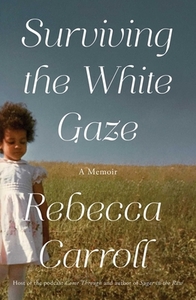Take a photo of a barcode or cover
I was truly surprised at how I connected with parts of Rebecca’s story. I’m also adopted (mother is Korean, father is white) and race was something that was never discussed growing up. So watching Rebecca navigate micro-aggressions and racism as a child, without fully understanding how to deal with it, was something that hit home. Her relationship with her birth mother was so frustrating yet such interesting part of her story. A wonderful memoir.
This was a deeply moving book and am glad the author survived her toxic childhood. Though our backgrounds differ we have the shared experience of living in New England and being in the company of few POC on any given day. When I was younger I suffered from imposter syndrome and struggled with maintaining my identity as a black woman. Glad those days are behind me.
Compelling story and writing. I'm glad to have the podcast to listen to next for more of Carroll's perspective.
Listened on audio and it was a great audiobook. As another reader said, it reads like narrative non-fiction which I didn’t enjoy too much.
Surviving the White Gaze by Rebecca Carroll is a memoir that looks at a Black girl growing up in very white New Hampshire.
Carroll explores her relationship with her well-meaning and loving white adoptive parents who are ultimately naive on what it means to connect their daughter to her Black heritage, along with the manipulative, demeaning, and abusive relationship that she develops with her white birth mother and finally the challenges of being able to even meet/connect with her Black birth father face to face.
It’s heartbreaking to hear Carroll lament about not being exposed to her biggest influences (Morrison, Lorde, Walker, Baldwin) until college and to watch her grapple with her desire to connect with her culture despite being raised as if she were white. Some of the most touching moments are when Carroll at long last finds mentors and friends who guide her in finding herself.
The writing style was simple, which allowed the story to come through without any distractions from the strong points. At times, I questioned if some of the conversations recounted were really as neat and tidy as the remembered dialogue implies, but even if they weren’t it doesn’t matter because the emotions being described were true. It is also clear that the book was written at least partially as a huge jab at Carroll’s birth mother, which only adds to the reader understanding the weight of the trauma that she experienced.
Carroll explores her relationship with her well-meaning and loving white adoptive parents who are ultimately naive on what it means to connect their daughter to her Black heritage, along with the manipulative, demeaning, and abusive relationship that she develops with her white birth mother and finally the challenges of being able to even meet/connect with her Black birth father face to face.
It’s heartbreaking to hear Carroll lament about not being exposed to her biggest influences (Morrison, Lorde, Walker, Baldwin) until college and to watch her grapple with her desire to connect with her culture despite being raised as if she were white. Some of the most touching moments are when Carroll at long last finds mentors and friends who guide her in finding herself.
The writing style was simple, which allowed the story to come through without any distractions from the strong points. At times, I questioned if some of the conversations recounted were really as neat and tidy as the remembered dialogue implies, but even if they weren’t it doesn’t matter because the emotions being described were true. It is also clear that the book was written at least partially as a huge jab at Carroll’s birth mother, which only adds to the reader understanding the weight of the trauma that she experienced.
challenging
dark
emotional
reflective
fast-paced
An emotional and honest telling of someone finding her identity. The writing style reminded me of a journal or blog, in the way that writers online openly share their stories, their pain, and their triumphs. It’s moving, hard to read at times, but ultimately hopeful.
Graphic: Racism
"...you're very pretty too, Becky," [Mrs. Gordon] continued, "for a black girl...They're usually very ugly, " continued Mrs. Gordon, scrunching up her face like she'd smelled something foul. "Very unattractive."
As the adopted daughter of white parents in rural New Hampshire and the only Black child in her town, Rebecca Carroll is assaulted daily by the racism that comes at her from all sides. She is excluded, tokenized, exoticized and treated with disrespect and disregard on a daily basis, all the while striving to be popular and accepted. Her adoptive parents, who are artsy, free spirited, and colorblind totally ignore her Blackness, ignoring the needs of her hair and skin and most of all, her sense of self as a Black child. In survival mode, Rebecca looks to connect with Black people on TV, and wherever and wherever she can find them.
When Rebecca is 11, she meets her white biological mother, Tess, with whom she establishes a relationship, but the woman is toxic and racist, herself. She tells Rebecca that her birth father was a "basically a dog, a jive ass black man who could bullshit like nobody's business." Tess reprimands Rebecca for wanting to be Black -- demeans her for trying out her Blackness, and does severe damage to Rebecca's incipient racial identity as she passes through adolescence.
This emotional memoir reveals the indignities that Carroll was forced to endure as the Black child of white parents, a challenging situation that is addressed in the previous book that I read and reviewed entitled "Motherhood So White." (The two books pair nicely). Carroll, now a successful author, details the exploration of her racial identity without sugarcoating the process. The reader feels deeply for Rebecca and empathizes with her words, "This is what black folks are to one another -- we are the light that affirms and illuminates ourselves to ourselves. A light that shines in its reflection of unbound blackness, brighter and beyond the white gaze."
As the adopted daughter of white parents in rural New Hampshire and the only Black child in her town, Rebecca Carroll is assaulted daily by the racism that comes at her from all sides. She is excluded, tokenized, exoticized and treated with disrespect and disregard on a daily basis, all the while striving to be popular and accepted. Her adoptive parents, who are artsy, free spirited, and colorblind totally ignore her Blackness, ignoring the needs of her hair and skin and most of all, her sense of self as a Black child. In survival mode, Rebecca looks to connect with Black people on TV, and wherever and wherever she can find them.
When Rebecca is 11, she meets her white biological mother, Tess, with whom she establishes a relationship, but the woman is toxic and racist, herself. She tells Rebecca that her birth father was a "basically a dog, a jive ass black man who could bullshit like nobody's business." Tess reprimands Rebecca for wanting to be Black -- demeans her for trying out her Blackness, and does severe damage to Rebecca's incipient racial identity as she passes through adolescence.
This emotional memoir reveals the indignities that Carroll was forced to endure as the Black child of white parents, a challenging situation that is addressed in the previous book that I read and reviewed entitled "Motherhood So White." (The two books pair nicely). Carroll, now a successful author, details the exploration of her racial identity without sugarcoating the process. The reader feels deeply for Rebecca and empathizes with her words, "This is what black folks are to one another -- we are the light that affirms and illuminates ourselves to ourselves. A light that shines in its reflection of unbound blackness, brighter and beyond the white gaze."
This story is so so important for foster and adoptive parents to understand what it’s like for Black children navigating not just being in a white home, but in a white community, and how that affects the way they navigate the world. This book reinforced the importance of the community I build for my son, and also gave me so many new insights I hadn’t thought about before. I am thankful the author was willing to share her story, and I hope that people read this and do better for their kids.
informative
reflective
medium-paced
challenging
hopeful
informative
reflective
medium-paced






